
Charles Bulfinch was an early American architect, and has been regarded by many as the first American-born professional architect to practice.

The Boston Athenaeum is one of the oldest independent libraries in the United States. It is also one of a number of membership libraries, for which patrons pay a yearly subscription fee to use Athenaeum services. The institution was founded in 1807 by the Anthology Club of Boston, Massachusetts. It is located at 10½ Beacon Street on Beacon Hill.
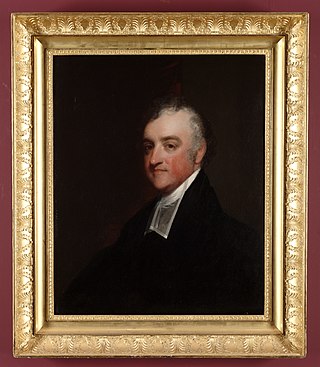
John Sylvester John Gardiner (1765–1830), aka John S. J. Gardiner, was an American Episcopal priest. He was Rector of Trinity Church, Boston, Massachusetts, president of Boston's Anthology Club, and active in the Boston Athenæum.

Harrison Gray Otis, was a businessman, lawyer, and politician, becoming one of the most important leaders of the United States' first political party, the Federalists. He was a member of the Otis family.

Charles Humphrey Atherton, an American Federalist politician, banker and a distinguished attorney from New Hampshire.
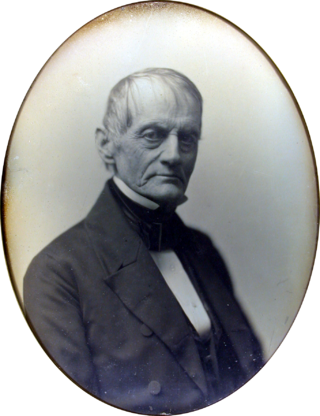
William Appleton was an American businessman and politician from Massachusetts. He was a trader, shipowner, and banker, and served as a U.S. representative from Massachusetts from 1851 to 1855, and again from 1861 to 1862.

The Church of the Holy Cross (1803-ca.1862) was located on Franklin Street in Boston, Massachusetts. In 1808 the church became the Cathedral of the Holy Cross. It was designed by Charles Bulfinch and was the first church built for the city's Roman Catholics.

Franklin Place, designed by Charles Bulfinch and built in Boston, Massachusetts, in 1793–95, included a row of sixteen three-story brick townhouses that extended in a 480-foot curve, a small garden, and four double houses. Constructed early in Bulfinch's career, Franklin Place came after he had seen the possibilities of modern architecture in Europe and had determined to reshape his native city. It was the first important urban housing scheme undertaken in the United States, and the city's first row-house complex. However, years of decline and the push of industry into the area forced its demolition in 1858.

Hepzibah Swan née Clarke was an American socialite of Boston, Massachusetts. She was a wealthy and well connected heiress who was among the most cosmopolitan, intelligent, and erudite of ladies in Federal Boston. Madame Swan was said to be charismatic, not least because of her wealth but also in good measure because of her effusive personal charm. Lifelong friends included revolutionary war heroes Henry Knox, Henry Jackson, Charles Bulfinch, Sarah Wentworth Apthorp Morton, and Harrison Otis.
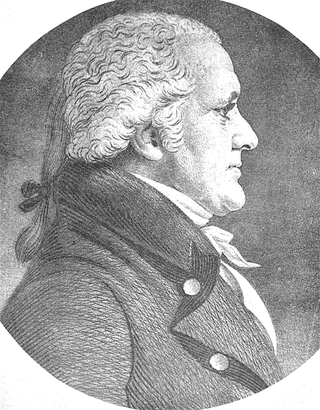
Perez Morton was an American lawyer, politician and revolutionary patriot in Boston, Massachusetts. He was Massachusetts Attorney General from 1810 until 1832.
Samuel Hale Parker (1781–1864) was a publisher and bookseller in 19th-century Boston, Massachusetts, United States. He published musical scores as well as novels, sermons, and other titles. He operated the Boston Circulating Library, and was among the founders of the Handel and Haydn Society.

The Haymarket Theatre (1796-1803) or Hay-Market Theatre was a theatre in late-18th century Boston, Massachusetts. Organized by Charles Stuart Powell, it occupied a large, wooden building "opposite the Mall on Common Street, near Hatch's Tavern." In addition to dramatic plays, the theatre presented some 62 musical entertainments during its first 5 years. The Haymarket "was seldom used after 1800, and on March 3, 1803, it was offered for sale at auction on the condition that it be removed in 60 days."

The Federal Street Theatre (1793–1852), also known as the Boston Theatre, was located at the corner of Federal and Franklin streets in Boston, Massachusetts, United States. It was "the first building erected purposely for theatrical entertainments in the town of Boston."
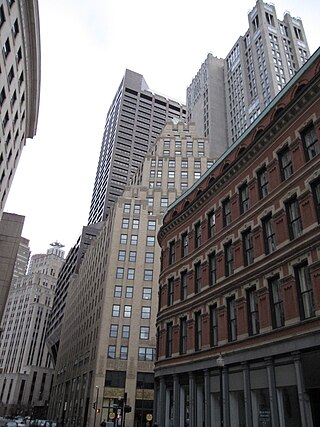
Franklin Street is located in the Financial District of Boston, Massachusetts, United States. It was developed at the end of the 18th century by Charles Bulfinch, and included the now-demolished Tontine Crescent and Franklin Place.

Charles Apthorp was an English-born merchant and slave trader in Boston, Massachusetts. Apthorp managed his import business from Merchants Row, and "in his day he was called the richest man in Boston." He also served in the employ of the British government for various schemes it attempted to implement in North America.
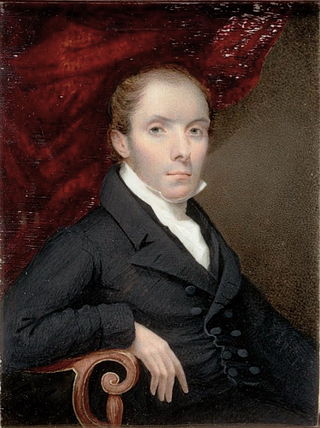
Thomas Edwards (1795–1869) was an artist in 19th-century Boston, Massachusetts, specializing in portraits. Born in London and trained at the Royal Academy, he worked in Boston in the 1820s-1850s, and in Worcester in the 1860s.
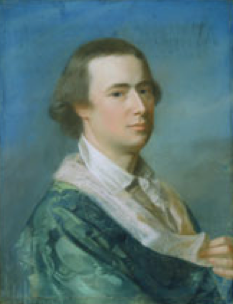
Joseph Barrell (1739–1804) was a merchant in Boston, Massachusetts, in the 18th century. During the American Revolution, he owned ships commissioned as privateers, such as the Vengeance, ca.1779. In 1792, Barrell was "elected to the board" of Massachusetts branch of the newly established Bank of the United States, along with "George Cabot, Jonathan Mason Jr., ... and Fisher Ames."

Charles Folsom was a classical scholar, librarian, and editor. He was librarian at Harvard College from 1823 to 1826.


















